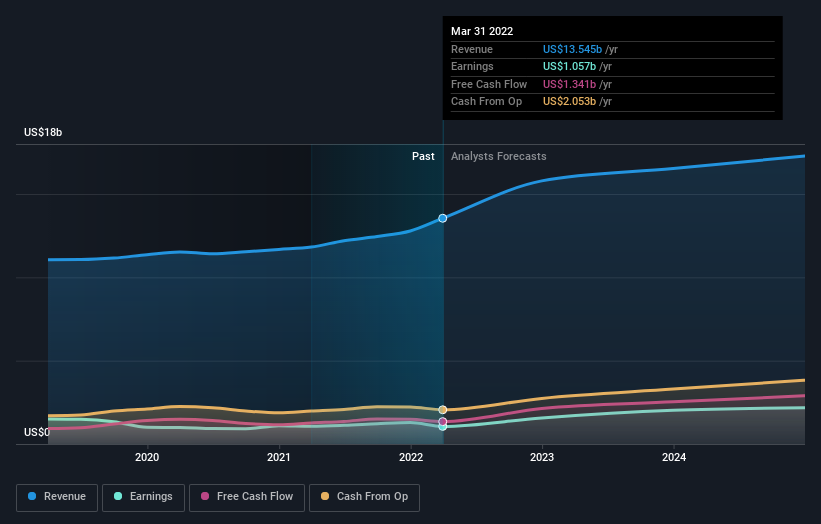Those who invested in Baxter International (NYSE:BAX) five years ago are up 32%
It hasn't been the best quarter for Baxter International Inc. (NYSE:BAX) shareholders, since the share price has fallen 13% in that time. But at least the stock is up over the last five years. However we are not very impressed because the share price is only up 25%, less than the market return of 77%.
Now it's worth having a look at the company's fundamentals too, because that will help us determine if the long term shareholder return has matched the performance of the underlying business.
Check out our latest analysis for Baxter International
In his essay The Superinvestors of Graham-and-Doddsville Warren Buffett described how share prices do not always rationally reflect the value of a business. One way to examine how market sentiment has changed over time is to look at the interaction between a company's share price and its earnings per share (EPS).
Baxter International's earnings per share are down 9.2% per year, despite strong share price performance over five years.
The strong decline in earnings per share suggests the market isn't using EPS to judge the company. Given that EPS is down, but the share price is up, it seems clear the market is focussed on other aspects of the business, at the moment.
The modest 1.6% dividend yield is unlikely to be propping up the share price. In contrast revenue growth of 4.4% per year is probably viewed as evidence that Baxter International is growing, a real positive. In that case, the company may be sacrificing current earnings per share to drive growth.
The company's revenue and earnings (over time) are depicted in the image below (click to see the exact numbers).
Baxter International is well known by investors, and plenty of clever analysts have tried to predict the future profit levels. If you are thinking of buying or selling Baxter International stock, you should check out this free report showing analyst consensus estimates for future profits.
What About Dividends?
As well as measuring the share price return, investors should also consider the total shareholder return (TSR). The TSR is a return calculation that accounts for the value of cash dividends (assuming that any dividend received was reinvested) and the calculated value of any discounted capital raisings and spin-offs. So for companies that pay a generous dividend, the TSR is often a lot higher than the share price return. We note that for Baxter International the TSR over the last 5 years was 32%, which is better than the share price return mentioned above. This is largely a result of its dividend payments!
A Different Perspective
Baxter International shareholders are down 10% over twelve months (even including dividends), which isn't far from the market return of -11%. Longer term investors wouldn't be so upset, since they would have made 6%, each year, over five years. If the stock price has been impacted by changing sentiment, rather than deteriorating business conditions, it could spell opportunity. I find it very interesting to look at share price over the long term as a proxy for business performance. But to truly gain insight, we need to consider other information, too. Take risks, for example - Baxter International has 2 warning signs (and 1 which is a bit unpleasant) we think you should know about.
We will like Baxter International better if we see some big insider buys. While we wait, check out this free list of growing companies with considerable, recent, insider buying.
Please note, the market returns quoted in this article reflect the market weighted average returns of stocks that currently trade on US exchanges.
Have feedback on this article? Concerned about the content? Get in touch with us directly. Alternatively, email editorial-team (at) simplywallst.com.
This article by Simply Wall St is general in nature. We provide commentary based on historical data and analyst forecasts only using an unbiased methodology and our articles are not intended to be financial advice. It does not constitute a recommendation to buy or sell any stock, and does not take account of your objectives, or your financial situation. We aim to bring you long-term focused analysis driven by fundamental data. Note that our analysis may not factor in the latest price-sensitive company announcements or qualitative material. Simply Wall St has no position in any stocks mentioned.

 Yahoo Movies
Yahoo Movies 

